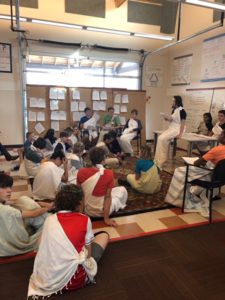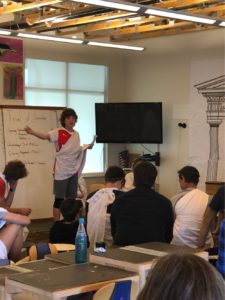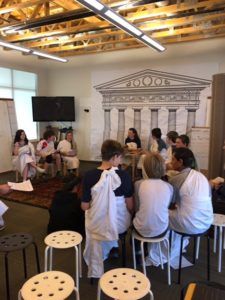This year’s overarching question at Acton Academy is: When does a hero submit to authority?
What rules your daily actions and thoughts:
- Your Conscious Mind,
- Your Unconscious Mind or
- The narratives deeply ingrained by your culture and upbringing?
During the Psychology Quest and Self Authoring genre, Launchpadders tried to answer this question as they:
- Explored different schools of psychology, including:
- Behaviorism and BF Skinner – “We are like rats in a maze. Forget emotions, focus on decisions and actions.”
- Psychoanalysis and Sigmund Freud – “We are driven by our unconscious mind.”
- Humanism and Abraham Maslow. – “We are driven by our needs as a whole person.”
- Cognitive psychology and Ulric Neisser – “We primarily react to the processes that govern thinking and feeling in the brain.”
- Dug deeply into the work of Jordan Peterson and how myths shape our views and actions.
- Wrote introspectively on the Self Authoring Project about how past narratives, current values and future dreams shape our thoughts and actions.
- Selected one of the moral frameworks below, and tried to live consistently by its tenets, day after day:
- Utilitarian – act in a calculated way to bring the most happiness to the largest number of people, even if it isn’t just, right (virtuous) or loving.
- Justice/Fairness – treat everyone the same way, by the same set of rules, even if it leads to more unhappiness in more people, isn’t right (virtuous) or loving.
- Virtuous – do the right thing, upholding a major virtue (name it), even if it leads to more unhappiness in more people, isn’t just or loving.
- Judeo-Christian – always act in a loving way towards others, even if tough love is needed, even if it leads to more unhappiness in more people, isn’t just or right (virtuous).
- Performed hands on experiments and deep Socratic Discussions about good and evil, including:
- Dreams and dream analysis;
- Lucid Dreams;
- Active Imagination;
- Shadow Work; and
- The Bandana and Stanford Prison experiments.
In the end, LP Eagles voted not to hold an exhibition, because so many of the lessons learned were intimate and personal.
If you want to see the morals of our next generation being formed in real time, the final discussion of the session is well worth watching.




